- Home
- Anthony Burgess
Collected Poems Page 3
Collected Poems Read online
Page 3
Could be allowed. The foul expletive and
The fair descriptive equally were banned.
Obscene – the very word was like a sneer,
Semantically null, a sneeze of fear,
A spurt of shock confronting what was known,
Though glossed as monstrous, in a privy zone.
What decency pronounced should be concealed
Was with a frightful candour all revealed.
Strange that our Western culture should proclaim:
What grants most pleasure also grants most shame.
But the anomaly, the joy-bred guilt
Is, when you think of it, already built
Into our sad condition, for the source
Of ecstasy is also bestial, coarse,
A lowly instrument of base discharge.
Again, note, the disparity is large
Between the exaltations that we bless
And the base agent’s total ugliness.
The foul familiar must be rendered strange
– The lingam and the yoni, the whole range
Of Sigmund’s symbols before we can start
Accepting sex as matter for high art.
Ulysses and The Rainbow, Lady C.
Primed act of privy criminality,
Because of shame wrapped in what should exalt.
As for The Well of Loneliness, its fault
Lay in its sex invisible but perverse.
Love – bad enough; love between women – worse.
To declare smugly: ‘Look, the battle’s done’
Is always perilous. Wars are never won.
A truce looks like a peace. It would appear,
However, that what book is published here
Will not be banned for its erotic theme.
True, Kirkup’s poem on a soldier’s dream,
A gay centurion eyeing the Crucified
As fodder for his gaiety, was denied
The right of print, the poet punished too,
But blasphemy has always been taboo.
A whole new generation flourishes
That does not know what a book-censor is
Except as history dead and buried. Still,
Obscenity is not nor ever will
Be an archaic word. The candid show
Of love, whether heterosexual or no,
Remains a most disputable terrain,
For there is more to sex than Lady Jane,
John Thomas, Boylan, Molly Bloom, et al.
Plain eroticism soon becomes banal;
The stronger gust of sexual cruelty
Begs exploitation. And coprophagy,
Necrophily, paedophily all gape,
Along with sodomy and murderous rape,
To batten on a hard-won liberty.
Is there a limit, then, on themes that we
Submit for the high alchemy of art?
This is a question we may only start
To argue when the frontiers that persist
Between the aesthete and the moralist
Have better signposts or have none at all.
As for the law, it is unwise to call
Upon the jurist’s skill to separate
Pornography and art. Let not the State,
Only the aesthetician, work it out
And tell us what the business is about.
The writer’s business, on one level, is
Exploiting varied possibilities
In human language. There’s a trinity
Of author’s ends. We clearly see the three –
The pornographic, the didactic, and
The static or aesthetic, lie or stand
At points upon a wide continuum.
Art’s in the middle, at the far ends come
Linguistic modes freed from the artist’s aim –
The urge to educate, or else inflame.
At one end the didactic; here we seek
The treatise, large or small, on the technique
Of dice or dance, the neutron’s mysteries,
The wide, in contrast, sky’s immensities.
Appeal is made to the intelligence,
The reason, the bald brain. In consequence,
{The language must be plain, denotative,
{Transparent. No word anywhere may give
{A breath of the ambiguous, and live.
Extruded is the human tear or laugh.
Seek at the other end the pornograph,
Whose etymology means nothing more
Than this: the simple picture of a whore.
Whores, by tradition, need no other names,
Being mere items in erotic games,
And the desirable anonymous
Who, in commercial artwork, ogle us
With a bared bosom or a silk-clad calf,
Are each themselves a kind of pornograph.
But, by extension, the term covers now
The why, the which, the what, the where, the how
Of naked congress, dual, multiple,
With, if need warrants, such additional
Refinements as the pickaxe and the whip,
A luscious area for censorship.
Cocteau – or was it Gide? I am not sure –
Called pornographs one-handed literature,
A term that could, with justice, be applied
To the effusions of the other side,
For, cooking in the kitchen, we may stand
Stirring a pan, book in the other hand.
What the two genres hold in common is
One-handed, yes, but scarcely literature.
That bright commodity that sits secure,
Or nearly, between genres much preferred
By votaries of the thing and not the word,
Wishes to move, and wishes to inform,
But, more, to keep imagination warm.
{Imagination has no ready role
{In the other two. A total lack of soul
{Marks book-as-tool and not organic whole.
The object of one object is to teach,
That of the other – help the reader reach
A swift purgation, often by himself.
Restore the instrument then to the shelf.
Both types attain their stark kinetic aims
Outside, outside – in action or in flames.
But literature is different. It arouses,
Enflames the Thames, engulfs both men and houses,
Drags at the heart, excites to cathartise,
Purges within its rhythm, satisfies.
The reader, calm of mind, all passion spent,
Closes its pages, cool and near content.
True, pornograph and didact are too near
For verbal art to stay aloof and clear,
And they may, with the unskilful artist, taint,
Pollute his purposes and smear his paint.
Thus, in the fiction of the factive kind,
That fills the empty hour and lulls the mind,
The informative and pornographic meet.
Hero and heroine, beneath a sheet
Made sweaty by their amorous exercise,
Recount the history of some enterprise
Or talk of Tuscan incunabula
(The Encyclopaedia Britannica
Fills up the empty space between their ears);
They quieten the poor fact-soaked reader’s fears
That mere diversion may become a bore
By falling to their exercise once more.
The continuum is bent, the two ends are
Made one when linear grows circular.
Condemn the factual when it pretends
To be inspired by true aesthetic ends
And, similarly, literary art
Must be attacked and toughly torn apart
When it essays a propagandist aim
(Teaching again); the artist may not claim
The right to wield the pedagogic chalk,
Throw out the drama and
resort to talk,
Hammer a tedious tuneless thesis, or
Endue the laurels of a senator.
And when the pornograph presumes to be
A sort of art, condemn it equally.
Do not invoke morality; your ground
Is an aesthetic one and deals with sound
And unsound literary pretensions. But
The door to moral questions is not shut.
The pornographic – is it bad or good?
It provokes onanism, as it should,
And moral theory or moral fact
Means nothing to the masturbator’s act.
Moral prescriptions never may intrude
On the amoral bliss of solitude.
But should pornography refollicate
The social act of sex, induce a state
Of mutual satisfaction, where’s the sin?
Keep out morality; let reason in.
Still, if the probing police commit to fire
Those ikons of a desperate desire,
Who will complain? So long as we ensure
The mauler’s paws are kept from literature
{Which, of its nature, is no instrument
{To gratify the onanist’s intent
{Or fire the rapist, we can be content.
We face another question now. Before
I pose it, let me travel back a score
Of years or more to a most heinous crime
Committed in the great permissive time.
Children were caught and tortured and their screams
Recorded in a montage helped by themes
Drawn from the vapid music of the age,
Then they were slaughtered coldly. Neither rage
Nor vengeance was the motive of the deed,
An acte gratuit. One killer who could read
Admitted frankly that he might have been
Infected by a glance at Sade’s Justine.
A lady, brooding on iniquity,
Let out a scream and screamed: ‘If only we
Could save one child from lethal agonies
By burning every book that was or is,
We should not hesitate,’ implying thus
The thing we knew – that books are dangerous.
Literature, certainly, is meant to hurt,
Seeking not to confirm but to subvert,
To prick complacency, but not to kill:
Here the perverted, not subverted will
Which, heaven be praised, is rare, can be impelled
To sin by what tradition has long held
To be not evil but beneficent.
Take, for example, the Old Testament,
Root of our culture, bright theophany,
Source of corruption for one man, for he,
Eyes misted by the steam of sacrifice,
Contrived his own sublunar paradise
By knifing children in Jehovah’s name.
Even the Catholic mass has garnered blame
For hinting anthropophagy to one
Who sought an intimate communion
By slaying all the women that he could
To drink their blood. ‘In God’s eyes it was good,’
God being he. We cannot legislate
For the unsullied children of the State
In terms of what will make the bad man worse,
The madman madder. The whitecoated nurse
Sequesters what is clearly venomous
To him but is pure meat and drink to us.
A boy reads Hamlet and is justified
In consummating family homicide.
And so let muted Hamlet join the banned.
The eye that reads King Lear directs the hand
That pulls a pair of streaming jellies out.
That books are instigators we must doubt,
Along with visual versions of the same,
Since they but copy life. Life is to blame.
The question I postponed I now present:
Does writing have an ethical intent
Even while taking Wilde’s prescript to heart –
That art’s created for the sake of art?
All right – we know that Pater said it first.
Dear Oscar was remiss enough to burst
The shackles of Paterian constraint,
Making repentant Dorian slash the paint.
He would not shatter, even if he could,
The bond that bolts pure beauty to the good.
For art proclaims nobility at best,
At worst a sick desire of being blest.
If its implied morality is not
The one that Church and State alike allot,
This is because it claims a wider scope
And stresses love much more than faith and hope.
No novel ever written praised the bad,
Diminished sanity and raised the mad
Except for some ironical effect.
Creators of necessity elect
{Creation not destruction as their theme,
{Fulfilment of a larger moral dream
{Than waking life is able to esteem.
And this condition is not blemished if
Out of the woodwork should exude a whiff
Of pure diablerie. Our William Blake
Sought to exalt hell just for heaven’s sake,
Finding in fire an energy to heat
Cold bottoms stuck to heaven’s judgment seat,
Or, if you will, a passion that might thaw
Enmarbled reason frozen into law.
The law must trust the artist: only he
Or she proclaims the human. And if we
Shudder at evil steaming from a page,
Then we must damp our moralistic rage,
Remembering that evil must be shown
Only that good may be the better known.
The battle is engaged. The winning side
Is not foreknown, but victory is implied
Even for the victim, should the victim be
Symbolic of a large humanity.
Art may imply, but not directly speak,
Scorning the straight path, prizing the oblique,
Hinting in elegance, loathing to shove
Us bodily into the lake of love.
Love. Now religion. A much graver theme
Confronts us. To begin, let us blaspheme.
Jesus, the bastard of a drunken brute,
Was gotten on the village prostitute.
His followers were active sodomites
Who dragged in Judas to their dark delights.
The heavenly kingdom was not for the just
But just the devotees of lawless lust.
{Read this, and then re-read it. Having read,
{Do not heap hot damnation on my head,
{But add inverted commas and ‘he said’.
I may have written this, but on behalf
Of some fictitious sneerer whose foul laugh
A fictional believer counters thus:
‘Your fiction is so vilely blasphemous
You damn yourself to darkness.’ The reply?
‘Christ was a liar and he taught a lie,
A bastard brat, son of a fucking whore,
His words a drunkard’s belch and nothing more.’
Our world is built of opposites. Not strange
That one mind can engender this exchange,
And it’s unjust to fasten on to me
The fouler voice of the antiphony.
Imagine death and take the blame for death?
Macbeth is bad, but Shakespeare’s not Macbeth.
Turn to a later giver of God’s laws
And you may libel him with greater cause.
Mohamed claimed no heavenly origin,
And to defame his essence is no sin.
‘This shoveller of camel-droppings who
Craftily married and pretended to
Broadcast the Word from Gabriel’s microphone
– We have
his word for it, but that alone –
Raped virgins under age and robbed the poor,
Corrupted Arab, Persian, Turk and Moor,
And left a bloody legacy of hate
To doubter, heretic and apostate,
A stinking rubbish dump made white with paint,
A shaitan masquerading as a saint.’
These words are mine, their import otherwise.
The gravamen of uttering them lies
With some dim personage who does not exist
Save in the fancy of the fantasist.
{We have this right – to voice the darker side;
{The devil’s sneer is there to be denied,
{To hear it lying and to say it lied.
Fanatics live by absolutist laws.
They, at this time of writing, are the cause
Of a free writer’s cowering in some den
Out of the reach, he hopes, of murderous men
Ordered to hate, but know not what they hate,
Assassins fed on hashish by a State
That re-instils the wretched image of
A God who raves for blood and not for love,
Who’re promised paradise but, better far,
Shekels for one swish of the scimitar.
For a new breed of Censor now arrives,
Equating human speech with human lives.
‘Follow our law,’ he thunders, ‘burn or ban
Whatever terrifies Islamic man,
{Even if he’s a tolerated guest
{Of polities where no faith is oppressed.
{He has the privilege of knowing best.
There is no God but Allah. Elohim,
God or Jehovah is a shadowy dim
Dull sketch of our invisibly bright One
Who tells us human revelation’s done.
For Nabi Musa, Nabi Isa fall
Before the greatest Nabi of them all.
Mohamed saw the last effulgence. Bow,
You rational future, to the Muslim now.
We hold our paynim hostages and slay
Should you oppose our word and disobey.’
Here’s the new foe of liberated speech,
Whose insolent arm presumes to stretch and reach
Beyond the confines of Islamic soil.
Allah alone, whose bounty flows in oil,
Will reign inviolate, unopposed, serene
In lands whose present God is the machine,
And churchbells yield to the muezzin’s wail
Should oil-rich Islam strike and then prevail.
Here is a slogan sanity must clutch:
‘Belief is dangerous. Don’t believe too much.’
When I was young, rocked on a papist knee,
Dense with the dogmas hammered into me,
On Rome’s authority I used to dub
The Church of England a mere cricket club,
A genteel congeries of vague belief,
Of veal-consumers scared of bloody beef,
With boyish bishops arguing unvexed
At contrary glossings of a text,

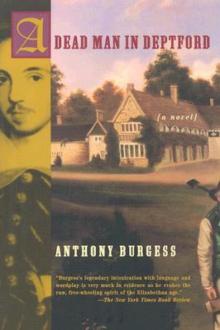 A Dead Man in Deptford
A Dead Man in Deptford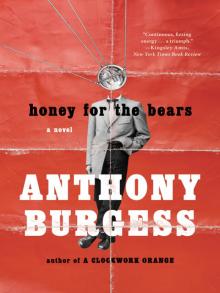 Honey for the Bears
Honey for the Bears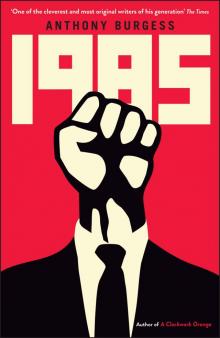 1985
1985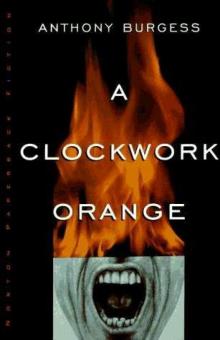 A Clockwork Orange
A Clockwork Orange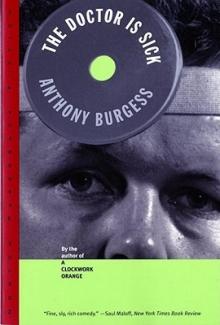 The Doctor Is Sick
The Doctor Is Sick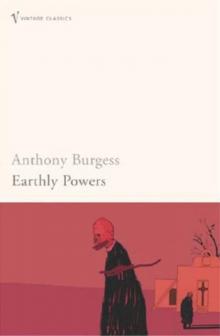 Earthly Powers
Earthly Powers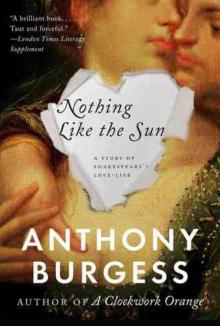 Nothing Like the Sun
Nothing Like the Sun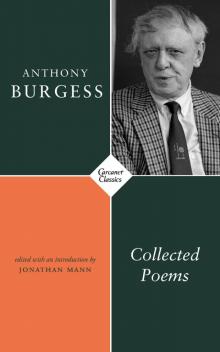 Collected Poems
Collected Poems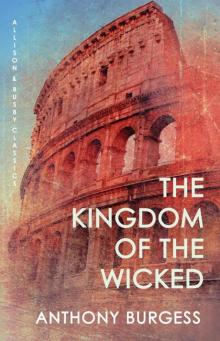 The Kingdom of the Wicked
The Kingdom of the Wicked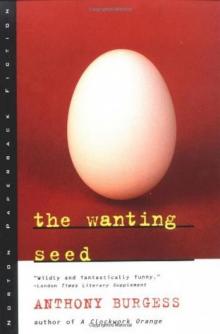 The Wanting Seed
The Wanting Seed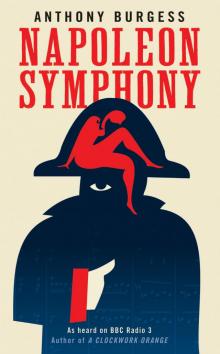 Napoleon Symphony
Napoleon Symphony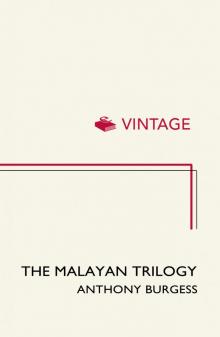 The Malayan Trilogy
The Malayan Trilogy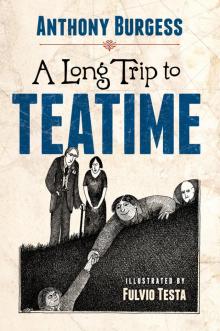 A Long Trip to Teatime
A Long Trip to Teatime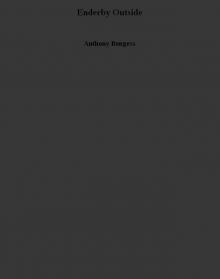 Enderby Outside
Enderby Outside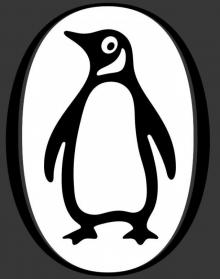 M/F
M/F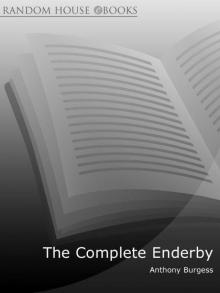 The Complete Enderby
The Complete Enderby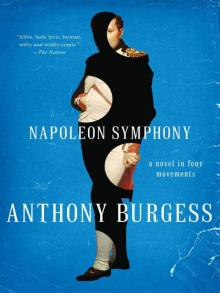 Napoleon Symphony: A Novel in Four Movements
Napoleon Symphony: A Novel in Four Movements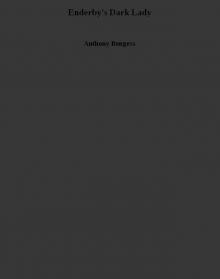 Enderby's Dark Lady
Enderby's Dark Lady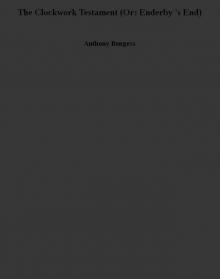 The Clockwork Testament (Or: Enderby 's End)
The Clockwork Testament (Or: Enderby 's End)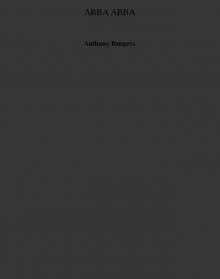 ABBA ABBA
ABBA ABBA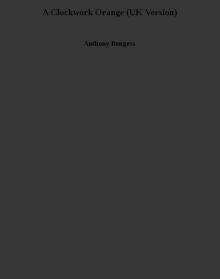 A Clockwork Orange (UK Version)
A Clockwork Orange (UK Version)